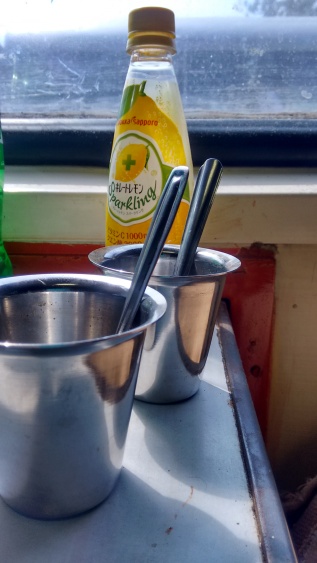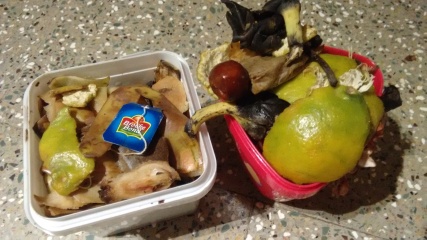By Claire Rao
When Bangalore was reeling under the so-called ‘garbage crisis’, I was blissfully untouched by it. The reason – I compost all organic waste, including garden waste, generated in my house and take all the recyclables to the Dry Waste Collection Centre (DWCC). I love the concept of being ‘Zero Waste’, which has become the new mantra in every aspect of my life. This idea might sound very utopian but after years of segregating waste and encouraging and educating people around me about the necessity of doing so, I have learnt that the easiest way is to drastically reduce the amount of waste that we generate.
Therefore, when I look at garbage piles featured in newspapers year after year, as if it would solve the problem, it tires me out. If we are really serious about tackling this problem, there is one thing all of us can do, and that is to REDUCE the amount of waste we generate.
 I believe India could be the best place for waste to be recycled, especially with the support of such vibrant waste picker communities. Unfortunately, it is not that simple. On the other hand, I have discovered that it is a great place to live a zero waste life. From the provision store to the bakery, from the vegetable market to the Hot Chips vendor, fresh ground coffee beans to soapnut powder – you can actually purchase most regular provisions without packaging by taking your own containers for refilling at the shop. A practice that was there not so long ago when all the plastic bags and other packaging were not available. It just needs a little bit of planning and you can’t imagine how good it feels when you know you are not contributing to any of the litter all around, especially the railway tracks used as dumping sites in and around populated areas.
I believe India could be the best place for waste to be recycled, especially with the support of such vibrant waste picker communities. Unfortunately, it is not that simple. On the other hand, I have discovered that it is a great place to live a zero waste life. From the provision store to the bakery, from the vegetable market to the Hot Chips vendor, fresh ground coffee beans to soapnut powder – you can actually purchase most regular provisions without packaging by taking your own containers for refilling at the shop. A practice that was there not so long ago when all the plastic bags and other packaging were not available. It just needs a little bit of planning and you can’t imagine how good it feels when you know you are not contributing to any of the litter all around, especially the railway tracks used as dumping sites in and around populated areas.
This habit became so much part of my nature that I couldn’t help being conscious about it wherever I went. A few years back while travelling to Coorg, a very pristine place, not being sure where the waste was being disposed I made it a habit to carry all the waste back with me. Later on I took up the challenge of reducing waste as much as possible by avoiding disposables from the food and beverage section at the airport, food packaged in aluminium in trains, bottled water, soaps, shampoos and other cosmetics in hotels. So my recent train journey from Bangalore to Mumbai to attend a wedding with my friend Shyamala was an experiment in a zero waste trip. Before departure, I got a few tips from another friend who had just returned from a long train journey and had attempted a zero waste trip herself.
Here is how we did it…
- We carried steel plates, spoons, glasses
- Tiffin boxes with home food since it is was a long journey
- Knife to cut fruits
- Carried two water bottles each and refilled them at stations
- Carried cloth hand towel and bath towel
- Soap nut powder and lemon to wash the dishes
- Organic bath soap (free of sodium lauryl sulphate)
- We carried all our organic and recyclable waste back home
- We carried our menstrual cups to avoid sanitary waste
 However, we did accept food wrapped in newspaper – e.g. chaats and omelettes, and took the newspaper back with our organic waste for composting. We also carried banana, apple, orange peels in a container for 3 days without any issue. Once we reached the hotel we made sure we got filtered water instead of bottled water, and we didn’t use any of the individually packaged toiletries. The wedding we attended was almost a zero waste event,though with a few challenges since it involved so many people. We made sure that the waste generated was segregated and the organic waste (the banana leaves with food waste) was sent to feed a biogas plant and the plastic table liner was sent for recycling. On the way back at the airport, we managed to get our coffee served in steel cups and food in reusable plates much to the amusement of the employees at the food court.
However, we did accept food wrapped in newspaper – e.g. chaats and omelettes, and took the newspaper back with our organic waste for composting. We also carried banana, apple, orange peels in a container for 3 days without any issue. Once we reached the hotel we made sure we got filtered water instead of bottled water, and we didn’t use any of the individually packaged toiletries. The wedding we attended was almost a zero waste event,though with a few challenges since it involved so many people. We made sure that the waste generated was segregated and the organic waste (the banana leaves with food waste) was sent to feed a biogas plant and the plastic table liner was sent for recycling. On the way back at the airport, we managed to get our coffee served in steel cups and food in reusable plates much to the amusement of the employees at the food court.
 Any citizens’ initiative to reduce the burden of waste to be handled, however small, might seem like a drop in the ocean but it can go a long way. Many communities in Europe like the province of Gipuzkoa in the Spanish Basque Country in 2011 refused to have an incinerator in their area. They showed their political representatives that they could be zero waste and handle their own waste responsibly. We should learn to do the same by being conscious of the waste we generate.
Any citizens’ initiative to reduce the burden of waste to be handled, however small, might seem like a drop in the ocean but it can go a long way. Many communities in Europe like the province of Gipuzkoa in the Spanish Basque Country in 2011 refused to have an incinerator in their area. They showed their political representatives that they could be zero waste and handle their own waste responsibly. We should learn to do the same by being conscious of the waste we generate.
Being human could be being zero waste!
(Pics by the author).


🙂 I am 65 and your first five points for train travel are exactly how our train journeys used to be when we were kids 🙂 our parents lived a zero waste life without calling it that! It was the pre plastic era, so all packaging was paper. My mum’s used sarees were tailored into our clothes and those became shopping bags that in turn became floor mops when they had lived their life. Never stepped out for shopping without bags in our hands, Our three cows’ dung along with garden waste gave us all the manure we needed for the garden and dried cow pats the fuel for heating bath water along with twigs from the garden and other combustible waste like paper packaging. The cows drank the water in which the rice was washed and ate the veggie peels. Our domestic help took away the extra cooked food. Coffee grounds and tamarind were used to scrub pots and pans. Well water from our open well met our domestic needs. Our cars were only used when the whole family went out together, otherwise the kids walked or bussed (shared transport) everywhere. The list is endless. Reducing ( consumerism was considered bad form :)), reusing and recycling ( though not called that) was a way of life. The only time I remember depositing anything in the garbage bin by the roadside was when something glass broke. And all this was in one of the most developed parts of then Bangalore, Basavanagudi.
Somewhere along the way we gradually lost it. Not at all helped by plastic. And then the consumerism. Now we have to unlearn all the bad stuff. 🙂
Great job though on your initiative..Needs a lot of commitment especially in the face of various versions of amusement, puzzlement and even derision these days for those forgotten ways 🙂
LikeLike
Good article, but not practically possible. We need a process in place so that we could do it as a part of community initiative. No one has so much time and passion like you, but would follow it with support.
LikeLike
If some of us are doing it and continue to do it, it is obviously practically very possible. One just needs to CARE about the earth, that’s all! And if one doesn’t care, then one can come up with any excuse 🙂 And why don’t you tell us who you are, ‘notsure’? We can help you get started on your own journey to zero-waste, and then you can become ‘sure’!
LikeLiked by 1 person
Awesome
LikeLike
Living life like a minimalist can also really help coz the first key is to REDUCE..like in older days when people would have just what they need. Though now with better affordability people have N number of things be it slippers or clothes or anything..which in turn is sadly leading to a lot of waste being created.And this will be devestating
LikeLike
Congrats to you and my friend SS on managing a zero-waste trip. The toughest part is altering peoples’ mindsets, I think. People often wonder what others would think, especially at airports and so on, when one carries their own utensils. Folks need to understand why they are doing it and feel proud of that, without worrying about others.
Somehwhat similar to those who set clear goals with regard to their health, and have to deal with idiots around who can’t understand why you wouldn’t load up on the free office buffet :). Rather than be embarrassed, a calm explanation and sticking to what you believe in helps. (SS would understand this bit well!)
Thanks for this post, and thanks Uma for the tips on how one can reduce day to day waste.
LikeLike
You people are doing a very good job.when we see the heap of plastic covers I feel very bad.people are not bothered for it.i carry my cloth bag for shopping always do composting and grow my veggies also.
LikeLike
Impressive! How do the DWCCs function? Part of the city’s problem is perhaps because the DWCCs cannot manage what the city generates. Of course it is utopian to expect the entire city to practice what you have preached.
LikeLike
Very well documented Claire! You’re a champion at reducing waste! It’s such a wonderful chain that gets completed-we go local, get the local economy going and establish sustainability of communities..You should write more often!
LikeLiked by 1 person
All leading organic food stores sell the organic grains in packaged form – how does one buy non packaged grains, rice, atta, poha, dalia from leading stores with quality assurance?
LikeLike
A number of local grocery outlets still sell non-packaged groceries – they will weigh out the item you need into a plastic bag – if you give them your container, you can avoid that plastic packaging. These shops do not have organic stuff, of course. Most organic outlets have pre-packed items in plastic packaging. Some of them are very conscious about this, and are trying to reduce this packaging or switch to non-plastic options like paper or cloth bags. One store which has been very successful in this is Chennai’s reStore – they ask their customers to bring their own containers for oil, etc. They weigh out the dry groceries into the customers’ containers or into cloth bags (which the customer can then return). Wish Bangalore’s organic stores would follow suit.
LikeLike
It is doable! And people like you and Ms. Vani Murthy are true role models.Inspired to follow suit.
LikeLiked by 1 person
Hai,
Ur article was very motivating . I also wanna do the same…. My heart hurts when I look around how dirty we have made this place…. I have strictly stopped buying carry bags … Can’t we have a compost plant area wise…. N use it for the Parks anf gardens in the locality… Where can I get tips in reducing garbage… The package covers… Lots of plastic waste …. Please guide me… I wanna contribute something for all that mother earth has given me….thanku….
Regards,
Beena.
LikeLike
Hi Beena, a few tips to reduce garbage. (1) Don’t *ever* use disposable plates, glasses or spoons. Whenever you go out, carry your own. Claire and our gang always do that. If, by chance, we forget to carry glasses, we don’t accept anything in paper or plastic cups even if we are dying for a cup of coffee! Sometimes some coffee shops or other eateries serve in disposable glasses or plates. While ordering, if you insist that you want to be served only in reusable crockery, they will oblige. (2) *Always* carry your own water bottle, never buy bottled water. An executive from Aquafina recently admitted that their bottles contain plain tap water, which means that you are paying a lot of money for water that can be had almost for free! (3) *Always* carry your own shopping bags. All of us keep 2-3 cloth bags folded up in our handbags. After we finish shopping and empty out the bags, we remember to fold them and put them back in our handbags. (4) As far as possible, don’t buy packaged products, especially in shiny, crinkly wrappers. None of us buy Lays, Kurkure, or similar munchies, or any of the branded biscuits or cookies, as they are all wrapped in the shiny crinkly packaging. This packaging is not recyclable, as it has a coating of tin on the plastic. If we have no option but to buy something wrapped in plastic, we buy stuff wrapped in clear plastic. We buy biscuits, cookies, bread, etc from the local bakery, and chips from the local Hot Chips. These products, aside from having minimal or no packaging, are also healthy, as they are fresh and do not contain preservatives. (5) If you are buying food from a restaurant, carry your own containers and don’t accept disposable containers – that’s what we used to do many years ago, before the advent of plastic bags. (6) As far as possible, don’t buy anything online, as most items come with loads and loads of packaging. The only exception I’ve heard of is Towness, which uses minimal and reusable packaging. Hope this helps.
LikeLiked by 2 people
Oh! I forgot two more points. (7) Instead of sanitary pads and tampons, use a menstrual cup or reusable cloth pads while menstruating. Each woman generates around 1,50,000 sanitary pads in her lifetime. That can be avoided by using a reusable menstrual cup.
(8) For babies, use reusable diapers made of soft comfortable cloth. These are much more comfortable , hygienic and healthier than disposable diapers.
LikeLike
Inspiring !
LikeLiked by 1 person
I sometimes get frustrated at the amount of waste generated by people around and feel whether my efforts really make a difference. And then… nature rewards my efforts by giving its abundance by way of harvest from my garden. Then I realize, yes my efforts have made a difference to the environment and she has shown her appreciation.
LikeLike
Kudos! Way to go Claire! Wonderful article. Next time I travel will try and follow suit!
LikeLiked by 1 person